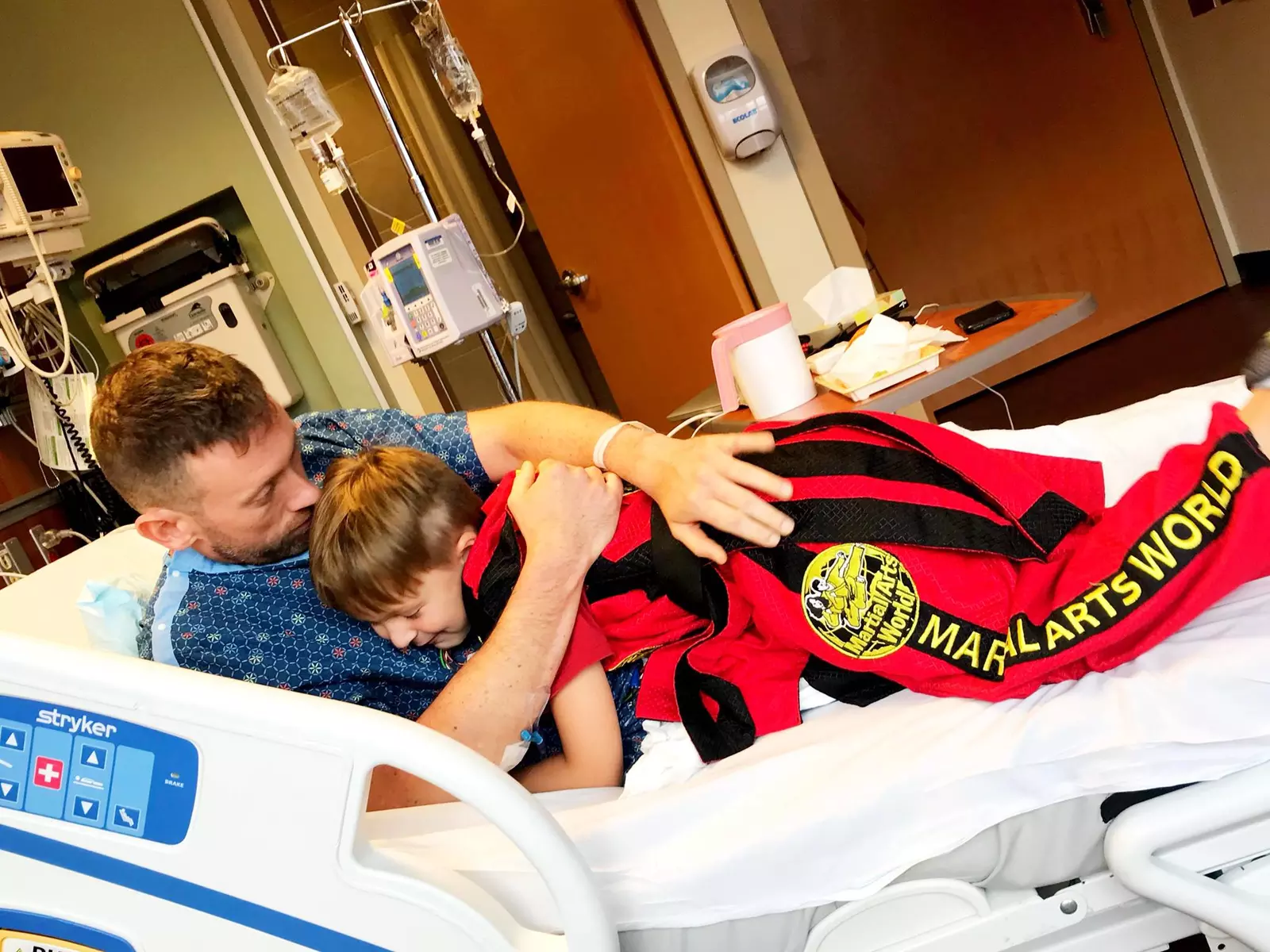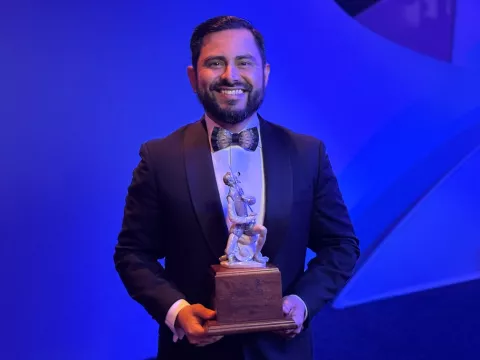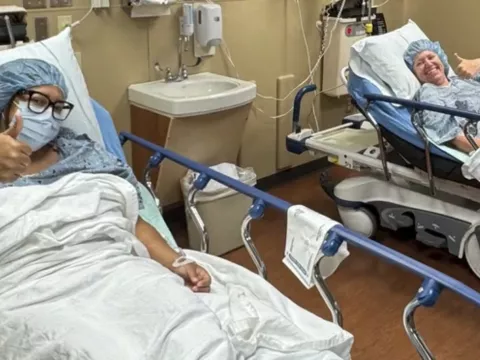- Jennifer Roberts
Choose the health content that’s right for you, and get it delivered right in your inbox.
Nine days after Robert Leetun’s 37th birthday, he decided to mow his lawn. Certainly nothing extraordinary about that July 5th day in Orlando, Florida. At 87 degrees for the high temperature, it wasn’t sweltering. But this day would be the start of a life-or-death medical emergency that doctors say Leetun probably could have never seen coming. But the combination of the heat, dehydration and an unknown blocked artery was a mix only quick action by the right medical professionals could overcome – even in a healthy 37-year-old.
After mowing the lawn, Leetun recalled an upset stomach and the inability to cool off.
“I kept throwing up and could not keep anything down,” Leetun remembers. “Overnight and into the next day, I was very dizzy to the point I could not walk.”
Leetun’s wife Lauren recalls finding her husband lying on the tile floor in the bathroom, trying to cool down. Nothing seemed to work. When he was unable to walk to the car so she could take him to the emergency room, she called for an ambulance.
“I really expected him to have a stomach bug, or maybe he overdid it in the yard and got too hot,” suspected Lauren. “I followed in the car to the hospital and remembered that I didn’t have any cash for the hospital valet, so I stopped at the ATM, really not thinking his condition was that serious. Even as I walked into the hospital to find him, the doctor told me he had a heart attack, and I said – ‘No, I think you have me confused with someone else – my husband has a stomach bug.’”

Emergency room doctors and nurses at AdventHealth Orlando immediately began assessing Leetun’s condition. After monitoring his EKG levels, they quickly determined he was indeed having a heart attack and needed emergency surgery. That is when Interventional Cardiologist Dr. Padma Raju was called in to perform the surgery.
“When we got Robert to the cardiac catheterization lab, we saw his right coronary artery was completely blocked,” recalls Raju. “We were able to open the artery and remove some other clots in the area, but that wasn’t the only issue he was facing.”
When Leetun left surgery and went to the ICU, Lauren recalls he was very agitated and tried to rip out his IVs. Dr. Raju remembers that he was sweating profusely after surgery. After additional tests and blood work, Dr. Raju and other clinicians felt Leetun was still severely dehydrated and likely had a heat stroke in addition to the heart attack.
“A brain scan showed I had a mild stroke during the process,” says Leetun. “It was in the back part of my skull and impacted my fine motor skills like typing.”
To fully recover from all these issues, doctors put Leetun in a medically induced coma to help his body heal.
“It was a terrifying time for our family,” says Lauren. “Our son Charles was seven, and daughter Elisabeth was less than one year old at the time. An AdventHealth Child Life Specialist helped me decide how much to tell Charles. She helped me find the words to explain to him truthfully what happened but reassure him that the doctors and nurses were doing everything they could to take care of his Daddy.”
After 11 days at AdventHealth Orlando, Leetun was able to return home. In just two weeks from that time, he was back at work. He’s now on some cholesterol and blood pressure medication and a baby aspirin daily. He has added running to his workouts three times a week, sometimes running past AdventHealth Orlando, where his unique medical event happened. He also exercises at the YMCA four times each week.
“This was a wake-up call for me,” says Leetun. “You have to take care of your health, or you have nothing. Your biggest commodity is your health. If you don’t take care of it, you could almost die like I did.”
Leetun realizes the significance of what he survived.
“I’m so grateful for the people at AdventHealth,” Leetun reminisces. “You don’t think about a heart attack at my age, especially the symptoms that I had with nausea and vomiting. I didn’t have the traditional chest pain that people often talk about.”
While the combination of conditions Leetun experienced was unique, a surprise heart attack isn’t.
“Anyone can have a heart attack,” Dr. Raju explains. “It’s believed that about a third of heart attacks start with very small blockages. Even if you have a small blockage of 10% to 20% and then a clot forms, it can quickly turn into a 100% blockage. A blockage has to be about 70% before a patient experiences symptoms, so in this case and others, it’s very likely patients don’t even know they have any blockage at all. It was so important that Robert was taken to AdventHealth Orlando – a large hospital facility where we had any type of specialist that we needed to assist. If he was in a smaller facility, I’m not sure he would have survived.”
Recent News
The Inspiring Wholeness podcast explains how to start an exercise routine, stay motivated and build endurance safely, to find your inner Ironman.
As the world rang in 2025, AdventHealth for Women welcomed the very first babies of the new year.
Dr. Joseph Lopez, chief of pediatric head and neck surgery at AdventHealth for Children, was honored with the prestigious Professional of the Year Award at the 27th Annual Don Quijote Awards.
Giving back to his hometown, Dr. Ryan Day brings advanced robotic surgery to local patients, offering life-saving care close to home.
The holiday season can increase heart attack risks due to overindulgence, stress, and ignored symptoms, but Dr. Hector Lozano advises moderation, staying active, managing stress, and sticking to...
Transplant is AdventHealth Transplant Institute’s 5000th kidney transplant
Deputies from local fire and police departments dressed as elves and dropped in to visit patients as part of an eight-year long tradition bringing festive cheer to kids and families staying at the...
AdventHealth is now using a fluorescent dye that lights up cancer cells during surgery, which is providing faster, more accurate treatment for patients.
On the newest Inspiring Wholeness podcast, Obie Diaz, local morning radio show host, shares how a routine physical eventually led to two open heart surgeries.
Inspired to change statistics around Black maternal deaths, AdventHealth for Women's Fourth Trimester Program offers enhanced postpartum care for Black mothers with high blood pressure.
AdventHealth University and Jobs Partnership Build Health Care Workforce Pipeline from Underserved Communities.
New LifeWorks Program provides health care workforce training to under-skilled job seekers throughout Central Florida.











